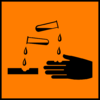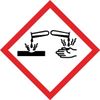Difference between revisions of "Caustic Soda"
(Tag: 2017 source edit) |
(Tag: 2017 source edit) |
Caustic soda (sodium hydroxide) is a white solid. We use caustic soda primarily as a paint stripper and for surface cleaning.
Sodium hydroxide is mainly used in the form of caustic soda. Solid sodium hydroxide is an integral part of drain cleaners in addition to aluminum shavings. Dissolved in water, the strong alkali (base) oxidizes the aluminum with the evolution of heat and hydrogen and then dissolves fats and proteins in the deposits by saponification.
Hot solution dissolves burn layers in cooking pots (not suitable for aluminum pots).
Contents
Dangers[edit | edit source]
Causes severe skin burns and eye damage.
Prevention[edit | edit source]
- Do not breathe dust / fume / gas / mist / vapors / spray.
- Wash thoroughly after handling.
- Wear protective gloves / protective clothing / eye protection / face protection.
Emergency Response[edit | edit source]
| First aid | Fire-fighting measures |
|---|---|
|
|
Accidental Release Measures[edit | edit source]
-
Security measures related to people
- Wear protective equipment.
- Keep out unprotected people.
-
Environmental protection
- Do not discharge into the drains or waterways.
-
Procedure for cleaning / picking up
- Take up mechanically.
- Send in suitable containers for recovery or disposal. Use neutralizing agent.
Handling and storage[edit | edit source]
If caustic soda is left unsealed in the air, it will react with carbon dioxide to form sodium bicarbonate or sodium carbonate. Therefore, it is stored in hermetically sealed containers.




Safe handling advice[edit | edit source]
- Use and open container with care.
- Avoid dust formation.
- Supply eye wash bottle.
Advice on protection against fire and explosion[edit | edit source]
- No special actions required.
Requirements for storage rooms and containers[edit | edit source]
- Provide alkali-resistant flooring.
- Do not use light metal containers.
Hints for combined storage[edit | edit source]
- Do not store together with acids.
- Keep away from metals.
Further information on storage conditions[edit | edit source]
- Keep container tightly closed.
- Store in a dry place.
- Product is hygroscopic.
Storage class VCI: 8 Corrosive substances
Safety data sheet[edit | edit source]
- Safety Data Sheet Caustic soda 98/99%. Detailed information of the manufacturer.
'''Caustic soda''' (sodium hydroxide) is a white solid. We use caustic soda primarily as a paint stripper and for surface cleaning.
Sodium hydroxide is mainly used in the form of caustic soda. Solid sodium hydroxide is an integral part of drain cleaners in addition to aluminum shavings. Dissolved in water, the strong alkali (base) oxidizes the aluminum with the evolution of heat and hydrogen and then dissolves fats and proteins in the deposits by saponification.
Hot solution dissolves burn layers in cooking pots (not suitable for aluminum pots).
==Dangers==
Causes severe skin burns and eye damage.
[[File:Hazard_C_Gefahrenzeichen_Ätzend.png|alt=caustic|right|100x100px]]
[[File:GHS_05,_Corrosive_substances.jpg|alt=GHS 05, caustic substances|right|100x100px|GHS 05, Ätzende Substanzen]]
<br />
==Prevention==
*Do not breathe dust / fume / gas / mist / vapors / spray.
*Wash thoroughly after handling.
*Wear protective gloves / protective clothing / eye protection / face protection.
==Emergency Response==
{| class="wikitable"
|+
!First aid
!Fire-fighting measures
|- style="vertical-align:top;"
| width="50%" |
*'''IF SWALLOWED''': Rinse mouth. '''DO NOT''' induce vomiting.
*'''IF ON SKIN''' (or on the hair): Take off immediately all contaminated clothing. Wash skin with water / shower.
*'''IF INHALED''': Move to fresh air and keep at rest in a position comfortable for breathing.
*'''IN CONTACT WITH EYES''': Rinse cautiously with water for several minutes. If applicable, remove existing contact lenses, if possible. Continue rinsing.
*Immediately call a POISON CENTER or physician.
*Targeted treatment (see label).
|
*'''Fire fighting measures''' based on the environment.
*'''Special protective equipment''' for firefighting. Wear full protective suit.
*'''Inappropriate extinguishing agents'''
**Product itself does not burn.
**Attention: '''violent reaction with water''' (heat development)
|}
==Accidental Release Measures==
*Security measures related to people
**Wear protective equipment.
**Keep out unprotected people.
*Environmental protection
**Do not discharge into the drains or waterways.
*Procedure for cleaning / picking up
**Take up mechanically.
**Send in suitable containers for recovery or disposal. Use neutralizing agent.
==Handling and storage==
If caustic soda is left unsealed in the air, it will react with carbon dioxide to form sodium bicarbonate or sodium carbonate. Therefore, it is stored in hermetically sealed containers.
<chem><math chem>NaOH(s) + CO2(g) -> NaHCO3</chem></math>
<chem>2 NaOH(s) + CO2(g) -> Na2CO3(s) + H20</chem>
<math>e^{i\pi}+1=0</math>
<br />
===Safe handling advice===
*Use and open container with care.
*Avoid dust formation.
*Supply eye wash bottle.
===Advice on protection against fire and explosion===
*No special actions required.
===Requirements for storage rooms and containers===
*Provide alkali-resistant flooring.
*Do not use light metal containers.
===Hints for combined storage===
*Do not store together with acids.
*Keep away from metals.
===Further information on storage conditions===
*Keep container tightly closed.
*Store in a dry place.
*Product is hygroscopic.
Storage class VCI: 8 Corrosive substances
==Safety data sheet==
*[[Media:Ätznatron Feststoff RossChemie 090128.pdf|Safety Data Sheet Caustic soda 98/99%]]. Detailed information of the manufacturer.
[[Category:Occupational Safety]]
<br />| Line 55: | Line 55: | ||
| − | <chem>NaOH + CO2-> NaHCO3</ | + | <math chem>NaOH(s) + CO2(g) -> NaHCO3</math> |
<chem>2 NaOH(s) + CO2(g) -> Na2CO3(s) + H20</chem> | <chem>2 NaOH(s) + CO2(g) -> Na2CO3(s) + H20</chem> | ||

